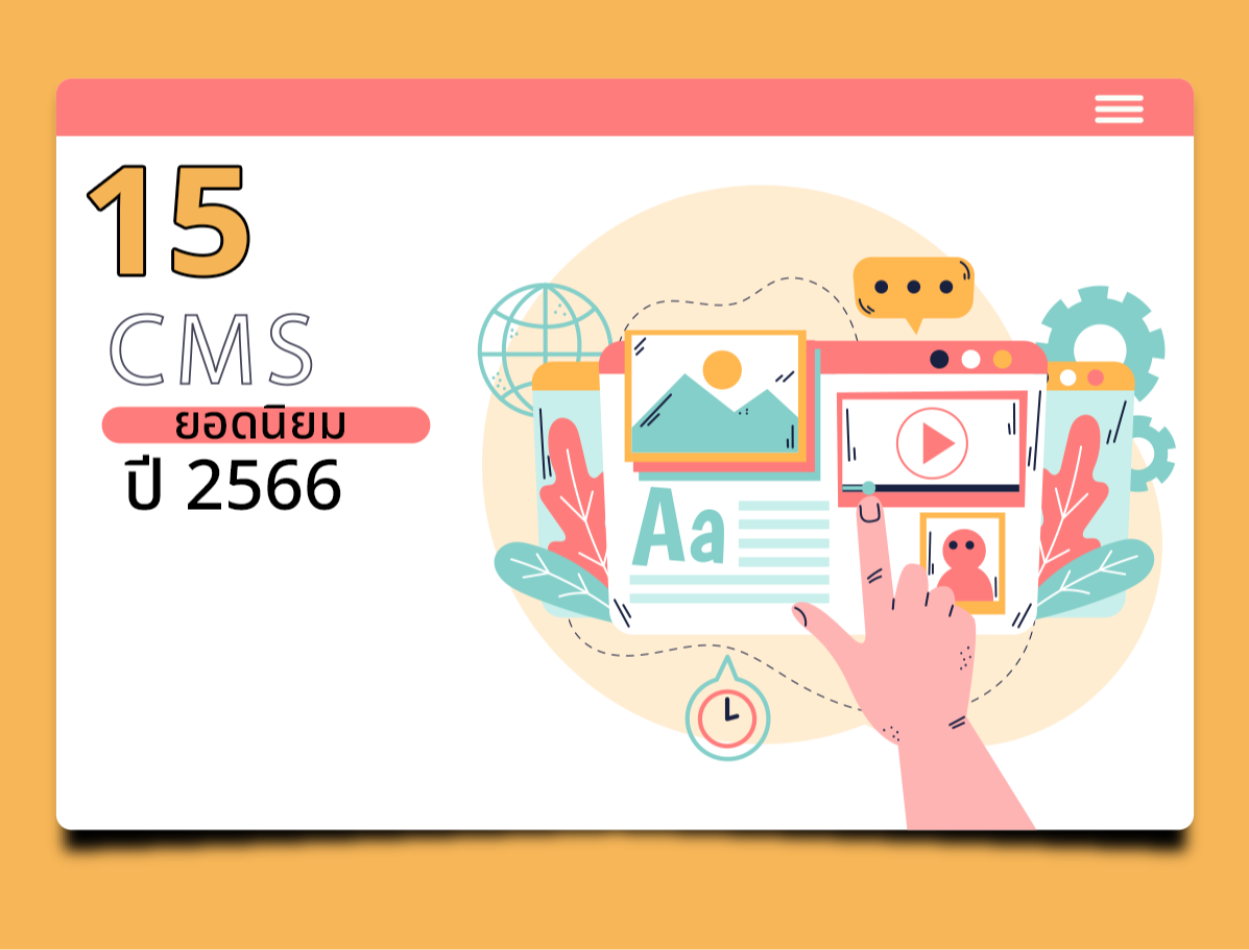
TOP 15 CMS Platforms in 2023
2023-09-14 10:59:15
TOP 15 CMS Platforms in 2023
Are you wondering which CMS platform to use to build your website? A CMS is a simple website content management system that doesn't require any coding. There are many CMS platforms to choose from. So what will you choose? What is a CMS? A CMS or website content management system. is a software that helps in creating websites easily. Web development is usually done with HTML, JavaScript, and CSS. If you build your website without a CMS, you'll need to learn these languages and their coding routines, but CMSs use automatic code generation. Makes creating websites easy
How to choose a CMS platform
Easy to use
If you need a CMS that allows you to easily create and edit content, you can add a drag-and-drop interface. Publish on a webpage.
design tool
CMS should have a large number of templates. Multiple options can be customized according to needs.
data transmission
A good CMS platform should have a tool that allows you to export and transfer data to other places.
For example, you can later decide to choose another platform or another hosting company. Data can be freely forwarded and transmitted.
Additional components
The CMS website has different extensions on all platforms. The extensions and plugins solve this problem. These are separate software that you only need to install in CMS software to expand and add new features.
Help and Support Options
Although the purpose of the CMS platform is to make website creation as simple as possible. If you encounter problems, you can check the FAQ, and some of them will have a strong customer service team and support community to assist you at any time. Day or night
Which CMS platforms are interesting?
WordPress
WordPress.org is the world's best and most popular CMS platform with market share. 43% of websites offer all services on the internet
Advantages.
flexible
No coding skills required
Make money from websites for free
There are many free and paid plugins to choose from.
Support for commercial websites
Can download content in XML format
shortcoming
Hosting and domain must be set up, and you will be responsible for security management, backup, and more.
WordPress offers a variety of options and flexibility, so you may need to understand how it works.
Price.
WordPress is a free platform, but it requires payment for a domain name (approximately $9-15 per year) and a hosting account to run WordPress (usually starting from $). 7.99 per month)
HubSpot CMS Hup
It is a fully integrated content management system designed to support the online market and business owners of the HubSpot CRM platform. This includes marketing automation tools, sales, services, and all types of operational CMS hubs. It is an excellent choice for growing enterprises and large organizations.
Advantages.
HupSpot's website generator is easy to use. No technical skills are required to use. Easy-to-use tools can be dragged and dropped. Built-in search engine optimization tools
Websites can be customized to fit specific target audiences or other groups.
For developers, there is a serverless feature with multiple theme options and command tools that can quickly customize content.
Security CMS Tools
Hotspot CMS seamlessly integrates with email tools and sales CRM extensions.
Disadvantages:
It's a free program.
HubSpot CMS is not suitable for e-commerce websites, but it can be easily compatible with WordPress and WooCommerce.
Price.
The CMS Hub has three levels: entry-level, professional, and enterprise. The entry-level plan is $23 per month and includes all the features required to create a fully functional website.
Joomla
Joomla is another popular free open-source CMS platform with many different templates and extensions. It is free, but you need hosting and domain name. According to the report, the market share of the entire website is 1.72%.
Advantages.
Joomla provides flexibility in multiple applications and options, as well as the ability to create complex or special commands.
Joomla can easily edit and manage content.
Joomla is a free open-source software supported by the user community.
You can use Joomla to create an e-commerce website
shortcoming
Complex.
Grandma is relatively rare.
There may be compatibility issues with other extensions or domains.
Price.
Joomla is free, but you will need to pay for the domain name and network hosting fees supported by Joomla.
WooCommerce
It is a popular e-commerce platform because it is flexible and easy to manage.
Technically speaking, WooCommerce is not a CMS platform, but a WordPress plugin. Therefore, you need to install WordPress on the website. WooCommerce can do it.
Advantages.
WooCommerce is available as free software, but you need a WooCommerce host and domain name to start.
WooCommerce has many themes to choose from, which makes your website look easy.
WooCommerce provides a wide range of extensions
You can use WooCommerce to sell physical or digital products. You can sell alliance products through alliance links.
You can manage inventory through WooCommerce.
WooCommerce provides PayPal and Stripe payments by default.
shortcoming
There are many options and tools to understand.
WooCommerce is technically compatible with any WordPress theme, but you may want to use a theme specifically created for WooCommerce.
Price.
The WooCommerce plugin is free, but you may need to pay additional plugin and extension fees.
Drupal
This is another open-source CMS platform. It is the platform behind some websites, including many university websites. Drupal is a great choice for developers or those who can hire developers.
Advantages.
Adding content on Drupal is easy, customizable, and flexible.
There are multiple balances to choose from and can be used as plugins.
Like other platforms, support is provided through community support options
Users can be managed through the system in the authorization options.
shortcoming
Drupal may be difficult for beginners
Most Drupal websites have specially customized themes created by developers, which can be very expensive.
Wix
Wix is a popular CMS platform. Although there are some limitations, it is beginner-friendly and may be worth considering as it is free.
Advantages.
Wix has a drag-and-drop interface that allows you to create designable pages. You can edit any part of the website.
Wix offers many templates for you to choose from, including mobile and computer support.
You can add a large number of applications to your website from the Wix application market. These applications work the same way as the WordPress plugin.
shortcoming
Once you select a template on Wix, you cannot change it to another template.
Unless you upgrade to a paid plan, you cannot open an e-commerce store on Wix.
Wix does not allow you to download and export data.
If you use the free plan, your website will have Wix brand domain names and advertisements. Advertisements make money for Wix, not you.
Price.
You can use Wix for free, but the domain name will belong to Wix, You can start paying from $13 per month (pre-paid annually).
Bigcommerce
It is a fully hosted e-commerce platform, sometimes referred to as a one-stop platform. BigCommerce hosts your website and provides you with a platform. CMS is real. It also manages your security and backups.
Advantages.
There is a trial plan, so you can try BigCommerce before making a decision.
You can use BigCommerce's free domain name, which looks like Mystore. mybigcommerce. com or you can pay for a custom domain name.
You can use multiple payment methods, such as PayPal, Apple Pay, and Amazon Pay, as well as credit or debit card payments.
BigCommerce provides support options that you can access directly from the dashboard 24/7, including email and mobile access support. Support the community and so on.
shortcoming
BigCommerce won't let you control your store like WooCommerce does. Limited themes and integrations may prevent you from using third-party services to develop your business.
When your sales reach the threshold set by the platform, you will automatically transfer to the next pricing plan level. You will spend a lot of money.
Price.
You need to pay a monthly subscription fee to use BigCommerce. The cheapest standard plan is $29 per month, with a maximum annual sales of $50000. Professional Program $299 per month
Shopify
One-stop hosted CMS platform. You don't need to purchase a host, install any software, or manage updates and backups.
Advantages.
You can accept credit and debit cards through Shopify Payments and PayPal.
Shopify has many extensions and themes.
Unlike BigCommerce, if your sales exceed a certain amount, there is no need to upgrade.
Shopify provides 24/7 editing support through real-time chat, email, and phone calls.
shortcoming
The cost of the program from start to finish is quite high.
Mini plugin
Price.
The cheapest plan is $39 per month. The most expensive plan is $399 per month. In addition, you can also receive a one-year advance payment discount.
As a commercial-hosted version of WordPress, using WordPress.com, you will receive a unified CMS platform hosted for you. You can purchase a domain name or use a free subdomain under the WordPress.com brand.
Advantages.
WordPress.com is easy to get started with. You can easily add and edit content, and beginners usually find CMS very simple.
You can use WordPress.com for free to create a website. You may want to pay at least for the cheapest plan.
The WordPress.com website has different themes (designs). You can easily switch between these themes in the dashboard. Your WordPress.com
As your website becomes larger and more popular, you can upgrade to a new plan. There are many options, including a plan that includes e-commerce features.
WordPress.com has a built-in analysis. This means that you can view statistics on the number of people visiting your website on the dashboard. This means that you cannot use Google Analytics unless you are using a business plan.
The transition from WordPress. org to WordPress. com in the future will be easy. Switch to a more powerful and flexible CMS.
shortcoming
Even with a business plan, WordPress.com has limited options for making money.
Unless you pay for at least the cheapest payment plan, you cannot add a custom domain name.
Unsupported plugin WordPress. org
You cannot completely control your website like WordPress. org.
Price.
The WordPress.com program is free, but if you want your domain name, you must choose one of the paid programs. The cheapest one is $48 per year ($4 per month). Alternatively, you can switch to other plans, including an online store e-commerce plan of $540 per year ($45 per month). In addition, there are also some options. WordPress VIP offers more features
Ghost
A CMS platform designed specifically for bloggers. The content or information you create can be displayed on the website. But it can also be sent to mobile applications or everything else.
Advantages.
When writing in the Ghost Markdown editor, you can use Markdown.
Ghost has a card-based content editor. The working principle of these editors is the same as that of WordPress blogs in the blog editor.
Excellent SEO support
You can set up bills to access website content.
shortcoming
Less flexibility in use than WordPress
Although Ghost was originally a CMS platform designed specifically for blogs, some users find it too complex.
Price.
The Ghost software is free, but you need to pay for domain name and network hosting. The starting price is $9 per month, but you need to pay $199 for upgrades. Increase the number of members per month
Magento
This is a free e-commerce platform provided by Adobe. You can download, host, and use it for free. You can pay Magento Commerce has achieved this and provides you with comprehensive support and hosting, but it is very expensive.
Advantages.
You can customize website pages through many plugins
You can manage a large number of products and customers, helping your business grow easily without slowing down your website speed. (But you may need to upgrade your hosting plan.)
Many well-known brands are using Magento, including Nike, Ford, and Coca-Cola.
You can connect various payment gateways to Magento. It also offers some options such as PayPal and COD. And built-in bank transfer.
shortcoming
If you are just starting an e-commerce business, Magento may be too difficult.
You may need a website developer to develop Magento. It can be very expensive.
The support provided may vary, especially if you are using Magento open source.
Price.
The price starts at around $22000 per year.
Textpattern
This is a simple CMS platform that has been available as an open-source platform since 2003.
Advantages.
Free editing of text, plugins, and templates
Flexible content layout, expansion, and classification, allowing readers to subscribe to specific RSS. The website can.
shortcoming
There is no one-click installation step for Textpatterns on any major web host. Installation is not difficult, but you need to be familiar with creating databases on web hosts. And use FTP upload software.
There are few text formats to choose from, and they are rarely popular.
Price.
Textpattern is free, but it requires a domain name and network hosting to create a website.
Blogger
This is a platform that has been in operation since 1999. It is a CMS platform designed specifically for bloggers, especially those from Google. Typically, bloggers will have a Blogspot on the domain name and can use your domain name.
Advantages.
Easy to use. You can create a blog in a few minutes.
Many gadgets can be added to blogs for free. You can collect things such as contact channels and advertisements.
The blog is provided by Google. You do not need to install anything, update anything, or pay hosting fees.
Blogger has a considerable amount of available space, and you can have up to 20 fixed pages. Your photos are stored on Google Drive. Therefore, these images will be included in your 15GB limit.
shortcoming
Blogger won't be your best CMS platform. It doesn't have any e-commerce features, etc.
Although all available themes are free, they are quite simple. You can edit them a bit, but you cannot create your themes.
You will be able to export posts, and if you want to switch from Blogger to WordPress, you will need to manually copy the page.
Price.
Blogger is free, and unless you purchase a custom domain name, you will not be charged any fees.
If you purchase a domain name from a domain registrar instead of purchasing a domain name from the blog itself, you can more easily remove the website from the blog in the future.
Bitrix 24
As a CMS business platform, it has other functions such as managing tasks, projects, communication, and customer relationships. Can work for free at the basic level
Advantages.
The basic level of Bitrix24 is free, which means you can try it out for free.
Bitrix24 comes with many features, providing you with everything you need to manage small and medium-sized companies.
Website builders have a drag-and-drop interface, including login pages and even e-commerce stores.
shortcoming
Bitrix24 is designed as a true CRM, so if you have CRM, the method of obtaining a CMS platform is quite complex.
Due to its rich functionality, you may find the Bitrix24 interface to be both confusing and cumbersome.
Price.
The service fee starts at $43 per month, and the professional service fee is $175 per month.
TYPO3
A free open-source CMS platform, much earlier than Blogger. It was first launched as an enterprise-level CMS in 1998. This means that it is very useful for both intranet websites (internal websites) and websites.
Advantages.
Managing large websites, including multilingual ones, is an excellent choice for large multinational corporations.
Since it is open source, if you are willing to hire developers to work for you, TYPO3 can be extended according to your needs.
You can modify the access permissions of individuals and groups working on your website.
You can add over 6000 extensions and applications to the TYPO3 site.
shortcoming
There are relatively few options.
Must have technical expertise in website writing to use TYPO3 and manage the website in the future.
What is the best CMS platform?
WordPress.org is a CMS platform that supports over 43% of websites on the internet.
On WordPress, you can open an e-commerce store. LMS Online Forum (Learning Management System) Membership websites, central market auction websites, and almost everything you can think of.
You can do unlimited things with WordPress, and if you find that with the development of the website, your website needs more space. You can upgrade your hosting to a hosted WordPress hosting company.
To start using WordPress, we recommend using Hostinger, Bluehost, or SiteGround for web hosting, as it is hosted by WordPress and WP Beginners
Frequently Asked Questions about CMS (FAQ)
Which CMS platform is most suitable for e-commerce?
The best e-commerce CMS platforms are WordPress and WooCommerce. Although other e-commerce platforms are also good, we believe that WooCommerce is the best platform for most online store owners.
What is the best CMS platform for creating small business websites?
WordPress makes creating small business websites very easy. It has many different themes (designs) to choose from and allows you to grow your business.
Can I use the CMS platform without a domain name or host?
All websites need to be hosted by platform-building companies such as Blogger, sometimes purchased from independent network hosts.
Do I need CMS to start my blog?
Yes, the blog platform is a CMS that allows you to easily publish content. There are many different blog platforms. Our article on the best blog platform compares some free and paid options.
What is the best CMS software for advanced users?
Due to its open-source nature, WordPress is typically a platform choice for advanced users and developers.
Leave a comment :
Recent post

2025-01-10 10:12:01

2024-05-31 03:06:49

2024-05-28 03:09:25
Tagscloud
Other interesting articles
There are many other interesting articles, try selecting them from below.

2024-03-25 09:26:59

2024-04-08 01:06:31

2025-04-17 06:40:38

2024-06-17 04:16:51

2023-09-06 11:48:34

2024-01-19 10:51:24



